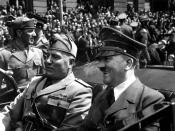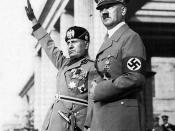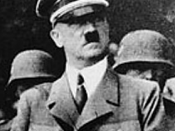I found the some very remarkable information in the most recent chapter that we have discussed in class "Dictatorship and the Second World War."ÃÂ I found vivid examples of how specific dictatorships ruled countries and regions, and how their actions affected the people they ruled, both negatively and positively. It largely encompasses the character of Adolf Hitler. His story has always intrigued me, not because he was a good leader for the people, but because he was such a powerful one. His actions added many multi-faceted changes to the world, as we know it today.
Conservative authoritarianism was found in several European countries, including Portugal and Spain. This type of authoritarian government was revived after World War I, and limited their power to major demands to taxes, army recruits, and passive acceptance. Another example of conservative authoritarianism was found in Poland, which was overturned under democratic government when General Joseph Pilsudski established military dictatorship.
Poland in turn was torn apart by conflicting political parties. Along these same lines is the government of totalitarianism. Totalitarianism was more of a radical dictatorship that emerged on the Soviet Union under Stalin and Hitler. It was also present under Mussolini at a lower level.
Joseph Stalin came into control of the Soviet Union after it's previous ruler Lenin died without renaming an heir. Stalin won the Soviet Union over a man named Leon Trotsky because he was more effective in gaining the support of the people. He also developed a theory of "socialism in one country"ÃÂ that was more appealing that Trotsky's "permanent revolution."ÃÂ Stalin meant by Socialism in one country"ÃÂ that the Soviet Union could build socialism on its own. Stalin developed the "Five Years Plans"ÃÂ to bring the Soviet Union back into competition with other surrounding countries. Stalin felt that they were...


